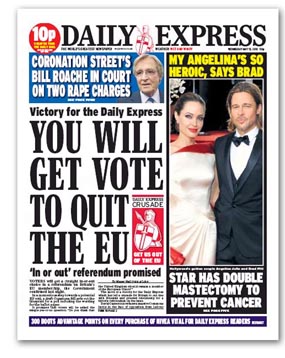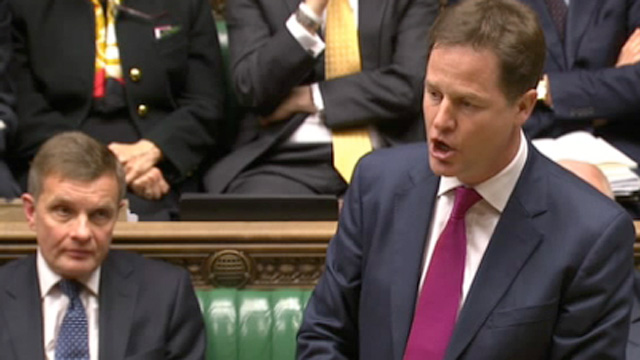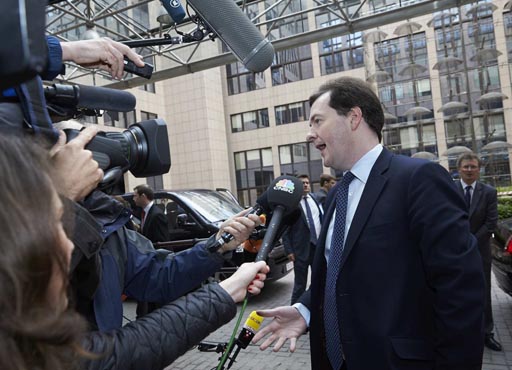Perhaps the highlight of the event was Edward Leigh taunting the Clegg with a copy of a 2008 Lib Dem leaflet (below left) in which he declared: "It's time for a real referendum on Europe" at the time of the Lisbon Treaty negotiations. Leigh, asked Mr Clegg whether the man pictured in the leaflet was "an impostor or just a hypocrite", only to get a dead-bat reply that he was in favour of a referendum when the rules changed.  Clegg, in turn, complained of the Conservatives of "constantly shifting the goalposts" on a referendum. He said the Commons had spent a hundred hours debating the Bill which gave a legal guarantee of a referendum if powers were transferred to Brussels. Nevertheless, he now seems to concede that a referendum is inevitable. Clegg, in turn, complained of the Conservatives of "constantly shifting the goalposts" on a referendum. He said the Commons had spent a hundred hours debating the Bill which gave a legal guarantee of a referendum if powers were transferred to Brussels. Nevertheless, he now seems to concede that a referendum is inevitable.In anticipation of a vote today on an amendment to the Queen's Speech, the deputy prime minister declared: "We on this side should go out and promote what is in the Queen's Speech, not spending days bemoaning what is not in the Queen's Speech", then adding: "I think we should stick to the priorities of the British people, which is growth and jobs". This is a theme echoed by Paul Goodman on Tory Diary, who is relying on a time-honoured formula in an attempt to defuse the "Europe" issue. "The matters that most move the British people at the ballot box", he claims, "are the meat, potatoes and two veg of British politics: the economy, hospitals, schools and crime - plus, of course, immigration". Notwithstanding that these issues are all, to a greater or lesser extent affected by our membership of the EU, Goodman is unwittingly illustrating what we should have a referendum on the EU. Such constitutional matters tend to be swamped by more immediate concerns in a general election, so they should be deal with separately, with the referendum format being the most appropriate mechanism.  What is interesting though is the contrast between this mealy-mouthed response and the triumphalism of the Daily Express which was the only national newspaper to give the referendum full frontal treatment this morning (right). Claiming a victory for its own campaign, it announces without equivocation that we are to get a straight in-or-out choice in a referendum on Britain's EU membership. What is interesting though is the contrast between this mealy-mouthed response and the triumphalism of the Daily Express which was the only national newspaper to give the referendum full frontal treatment this morning (right). Claiming a victory for its own campaign, it announces without equivocation that we are to get a straight in-or-out choice in a referendum on Britain's EU membership.In a dismissive response, however, Nigel Faragedeclares that, "This latest talk of an EU Referendum is nothing more than gesture politics". Thus, his earlier-declared stance of planning to stand for Westminster in 2015 is still in force, which means that the effect of UKIP's intervention could be to ensure that we have a Labour government and no referendum. Meanwhile, we have the putative rebellion of up to 100 MPs, in the Queen's Speech vote, which is scheduled for 7.15 this evening. As Labour and the Lib-Dems were whipping their MPs against the motion, it is almost certain to fall. Dominic Sandbrook in the Daily Mail is amongst the many who see in this evidence of the Conservative Party tearing itself apart, Sandbrook himself relying on comparisons between Mr Cameron and John Major. This also allows the loss-making Guardian to question Mr Cameron's leadership skills, asserting that he once led his party by challenging it, but now meekly muddles through by pandering to its obsessions. But, for all that, the publication of the draft Bill seems to have had an effect. We are told that the rebellion is "fading away", possibly signifying that MPs attach more significance to the referendum promise than does Mr Farage. Certainly, an evidently frustrated Daniel Hannan has bought the package – but then you would expect that. However, one has a sneaking sympathy for his complaints about the tendency of lobby journalists to look at the EU through the tinted glass of party management. He thus observes that, amid the hubbub about "Tory splits", we are in danger of missing the magnitude of what is taking place. We are no fans of young Hannan here, but in this one instance, I tend to veer closer to his "take" than anything the likes of Iain Martin has to offer. This man, whose own judgement is very often suspect, thinks the Conservatives have "lost the plot". To me, that is the kettle calling the pot black. I think we are looking at an event of some magnitude here, one which the media and the serried ranks of MPs have not entirely succeeded in trivialising. And such are the dynamics of the Cameron offer that I would not be entirely surprised to see Labour and the Lib-Dems supporting the idea of a referendum. Indeed, Cameron is now on the attack, saying that the "focus" must now shift to Labour and the Lib-Dems and whether or not they would be prepared to offer the British public a vote on Europe. He is criticising the two party leaders for "pretending nothing has changed" in the EU in recent years, putting them on the back foot. But, once the events of this day are over, the real focus must then shift to king-maker Farage and his UKIP supporters. As the reality of a referendum seems to be firming up, Farage may come under pressure to rethink his somewhat glib response. If it has become the role of UKIP to deny us a referendum on the EU, then he had better start telling us what he has in mind as an alternative. COMMENT: COMBINED REFERENDUM THREAD Richard North 15/05/2013 Edit |
EU budget: a done deal
Wednesday 15 May 2013
The "amending budget no.2" will add about £800 million to Britain's EU bill, with potentially another £400 million to find when the complete deal is reached. That will come with the second tranche, expected to be agreed after the summer break, bringing the additional British liability to £1.2 billion. The sum so far agreed represents rise of 5.5 percent on the original budget of €133 billion agreed for this year, itself and increase on the previous year's budget (2012) of €129.1. With the budget now standing at €140.3 billion, that represents an 8.7 percent year-on-year increase, kicking into touch any idea of EU budgetary restraint. Needless to say, Mr Osborne has been very quiet about this, and the UK media has been playing it relatively low key, making light of the British humiliation. Only the BBC hints at the scale of the defeat, citing a British government source who said the government could not support the amending budget. But, with the vote taken by QMV, there was nothing a powerless Mr Osborne could do. Ironically, this came on exactly the same day that the Conservative Party published its draft Bill for an EU referendum. The Party could well have pointed out that we were having to find another £1.2 billion to feed the ravening maw of Brussels, making it another good reason why we should be planning our exit. And still there is the battle of the multi-annual budget to come. Then there will be many more amending budgets to come, as the "colleagues" attempt to chip away at the hidden deficit which technically makes the EU insolvent. Unsurprisingly, we saw yesterday Kenneth Clarke claim that us leaving the EU could "spell catastrophe for the economy". What Clarke didn't specify, of course, was that the real catastrophe would be to the EU Commission's economy. They desperately need our money – and much more of it. We have not heard the last of this. COMMENT THREAD |

